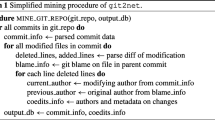Abstract
Software repositories, such as versioning, bug reporting, and developer mailing list archives contain valuable data for analyzing the history of software projects and its dynamics. In this chapter, we focus on the analysis of the communication and collaboration in software projects and present an approach that works on software archives with social network analysis techniques. Our tool called STNA-Cockpit provides both, a meta-model to represent communication and collaboration and a graph visualization technique to interactively explore instances of the meta-model. These instances are reconstructed from CVS, Bugzilla, and mailing list data. In a case study with the Eclipse Platform Core project data we demonstrate that with STNA-Cockpit one can observe project dynamics for certain periods of time. This allows, for example, project managers to early identify communication bottlenecks, contributor and expertise networks, or to understand how newcomers can be integrated fast and efficiently into their team.
Access this chapter
Tax calculation will be finalised at checkout
Purchases are for personal use only
Similar content being viewed by others
References
Aberdour M (2007) Achieving quality in open source software. IEEE Software 24: 58–64.
Batagelj V, Mrvar A (2003) Pajek – Analysis and visualization of large networks. Graph Drawing Software, Springer, pp. 77–103.
Bird C, Gourley A, Devanbu P, Swaminathan A, Hsu G (2007) Open borders? Immigration in open source projects. Proceedings of the International Workshop on Mining Software Repositories, IEEE Computer Society Press.
Borgatti SP, Everett MG, Freeman LC (2002) Ucinet for Windows: Software for Social Network Analysis. Harvard, MA: Analytic Technologie.
Crowston K, Wei K, Li Q, Eseryel UY, Howison J (2005) Co-ordination of free/libre open source software development. Proceedings of the International Conference on Information Systems, Association for Information Systems, pp. 181–193.
Ducheneaut N (2005) Socialization in an open source software community: A Socio-technical analysis. Computer Supported Cooperative Work 14: 323–368.
Fogel K (2005) Producing Open Source Software: How to Run a Successful Free Software Project. Sebastopol, CA: O’Reilly Media.
Gall HC, Fluri B, Pinzger M (2009) Change analysis with evolizer and change distiller. IEEE Software 26: 26–33.
Ghosh RA (2003) Clustering and dependencies in free/open source software development: Methodology and tools. First Monday 8(4).
Girba T, Kuhn A, Seeberger M, Ducasse S (2005) How developers drive software evolution. Proceedings of the International Workshop on Principles of Software Evolution, IEEE Computer Society Press, pp. 113–122.
Howison J, Inoue K, Crowston K (2006) Social dynamics of free and open source team communication. Proceedings of the International Conference on Open Source Software, Boston, Springer, pp. 319–330.
Huang SK, Min Liu K (2005) Mining version histories to verify the learning process of legitimate peripheral participants. Proceedings of the International Workshop on Mining Software Repositories, ACM Press.
Levenshtein VI (1966) Binary codes capable of correcting deletions, insertions and reversals. Soviet Physics Doklady 10: 701–710.
Lopez-Fernandez L, Robles G, Gonzalez-Barahona JM (2004) Applying social network analysis to the information in cvs repositories. Proceedings of the International Workshop on Mining Software Repositories.
Malone TW, Crowston K (1994) The interdisciplinary study of co-ordination. ACM Computing Surveys 26: 87–119.
Ogawa M, Ma KL, Bird C, Devanbu P, Gourley A (2007) Visualizing social interaction in open source software projects. Proceedings of the International Asia-Pacific Symposium on Visualization, IEEE Computer Society Press, pp. 25–32.
Ohira M, Ohsugi N, Ohoka T, Matsumoto K (2005) Accelerating cross project knowledge collaboration using collaborative filtering and social networks. Proceedings of the International Workshop on Mining Software Repositories, ACM Press.
Sack W (2001) Conversation map: An interface for very large-scale conversations. Journal of Management Information Systems 17: 73–92.
Sack W, Detienne F, Ducheneaut N, Burkhardt JM, Mahendran D, Barcellini F (2006) A methodological framework for socio-cognitive analysis of collaborative design of open source software. Computer Supported Co-operative Work 15: 229–250.
Scacchi W (2007) Free/open source software development. Proceedings of the Joint Meeting of the European Software Engineering Conference and the Symposium on the Foundations of Software Engineering, ACM Press, pp. 459–468.
Xu J, Gao Y, Christley S, Madey G (2005) A topological analysis of the open source software development community. Proceedings of the Proceedings of the Annual Hawaii International Conference on System Sciences, IEEE Computer Society Press.
Author information
Authors and Affiliations
Corresponding author
Editor information
Editors and Affiliations
Rights and permissions
Copyright information
© 2010 Springer-Verlag Berlin Heidelberg
About this chapter
Cite this chapter
Pinzger, M., Gall, H.C. (2010). Dynamic Analysis of Communication and Collaboration in OSS Projects. In: Mistrík, I., Grundy, J., Hoek, A., Whitehead, J. (eds) Collaborative Software Engineering. Springer, Berlin, Heidelberg. https://doi.org/10.1007/978-3-642-10294-3_13
Download citation
DOI: https://doi.org/10.1007/978-3-642-10294-3_13
Published:
Publisher Name: Springer, Berlin, Heidelberg
Print ISBN: 978-3-642-10293-6
Online ISBN: 978-3-642-10294-3
eBook Packages: Computer ScienceComputer Science (R0)




